大学英语四级考试翻译练习题(6)
- 格式:pdf
- 大小:5.69 KB
- 文档页数:2
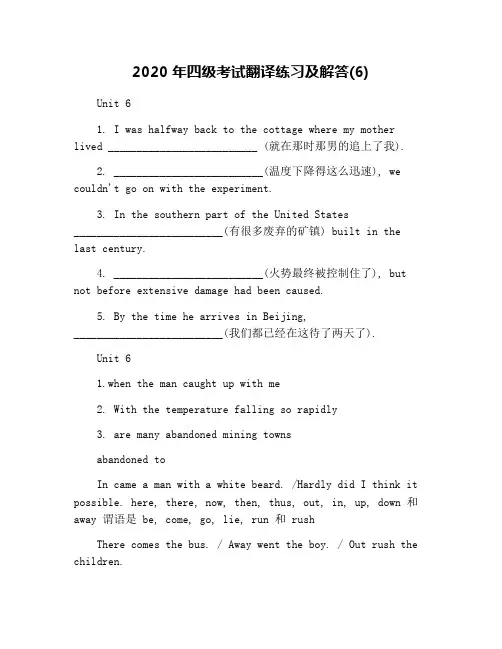
2020年四级考试翻译练习及解答(6) Unit 61. I was halfway back to the cottage where my mother lived __________________________ (就在那时那男的追上了我).2. __________________________(温度下降得这么迅速), we couldn't go on with the experiment.3. In the southern part of the United States__________________________(有很多废弃的矿镇) built in the last century.4. __________________________(火势最终被控制住了), but not before extensive damage had been caused.5. By the time he arrives in Beijing,__________________________(我们都已经在这待了两天了).Unit 61.when the man caught up with me2. With the temperature falling so rapidly3. are many abandoned mining townsabandoned toIn came a man with a white beard. /Hardly did I think it possible. here, there, now, then, thus, out, in, up, down 和away 谓语是 be, come, go, lie, run 和 rushThere comes the bus. / Away went the boy. / Out rush the children.Here it is. / There she comes!4. The fire was finally / at last brought under controlbring sth. Under control, get sth. under control ; sth. is under control5. we will have stayed here for two days。
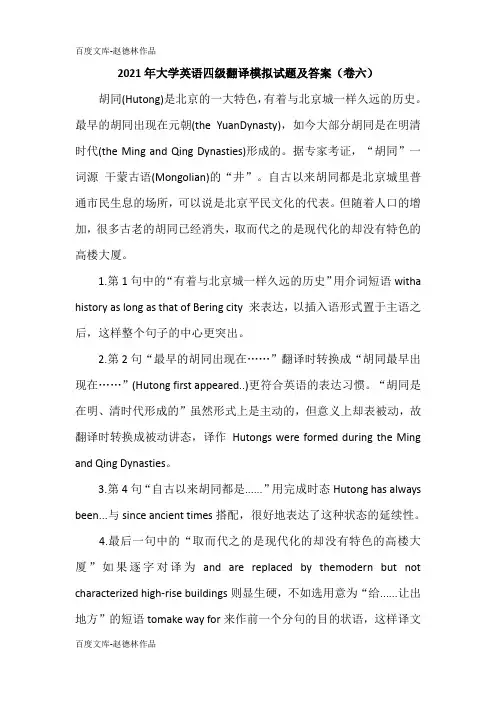
2021年大学英语四级翻译模拟试题及答案(卷六)胡同(Hutong)是北京的一大特色,有着与北京城一样久远的历史。
最早的胡同出现在元朝(the YuanDynasty),如今大部分胡同是在明清时代(the Ming and Qing Dynasties)形成的。
据专家考证,“胡同”一词源干蒙古语(Mongolian)的“井”。
自古以来胡同都是北京城里普通市民生息的场所,可以说是北京平民文化的代表。
但随着人口的增加,很多古老的胡同已经消失,取而代之的是现代化的却没有特色的高楼大厦。
1.第1句中的“有着与北京城一样久远的历史”用介词短语witha history as long as that of Bering city 来表达,以插入语形式置于主语之后,这样整个句子的中心更突出。
2.第2句“最早的胡同出现在……”翻译时转换成“胡同最早出现在……”(Hutong first appeared..)更符合英语的表达习惯。
“胡同是在明、清时代形成的”虽然形式上是主动的,但意义上却表被动,故翻译时转换成被动讲态,译作Hutongs were formed during the Ming and Qing Dynasties。
3.第4句“自古以来胡同都是......”用完成时态Hutong has always been...与since ancient times搭配,很好地表达了这种状态的延续性。
4.最后一句中的“取而代之的是现代化的却没有特色的高楼大厦”如果逐字对译为and are replaced by themodern but not characterized high-rise buildings则显生硬,不如选用意为“给......让出地方”的短语tomake way for来作前一个分句的目的状语,这样译文更生动流畅。
参考译文:Hutong, with a history as long as that of Beijing city, is a major feature of Beijing. Hutong first appeared during the Yuan Dynasty, and most of today's Hutongs were formed during the Mingand Qing Dynasties. According to experts, the word "Hutong" came from Mongolian language, meaning "a well". Hutong has always been the living place for ordinary residents since ancient times and it's said to be a representative of Beijing civilian culture. However, with the increase of the population, many old Hutongs have disappeared to make way for modem but not characterized high-rise buildings.中国传统婚礼反映着中国的哲学思想。
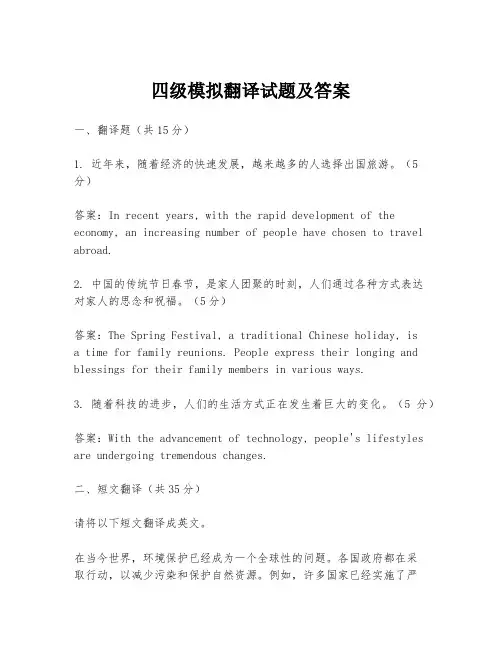
四级模拟翻译试题及答案一、翻译题(共15分)1. 近年来,随着经济的快速发展,越来越多的人选择出国旅游。
(5分)答案:In recent years, with the rapid development of the economy, an increasing number of people have chosen to travel abroad.2. 中国的传统节日春节,是家人团聚的时刻,人们通过各种方式表达对家人的思念和祝福。
(5分)答案:The Spring Festival, a traditional Chinese holiday, isa time for family reunions. People express their longing and blessings for their family members in various ways.3. 随着科技的进步,人们的生活方式正在发生着巨大的变化。
(5分)答案:With the advancement of technology, people's lifestyles are undergoing tremendous changes.二、短文翻译(共35分)请将以下短文翻译成英文。
在当今世界,环境保护已经成为一个全球性的问题。
各国政府都在采取行动,以减少污染和保护自然资源。
例如,许多国家已经实施了严格的环境法规,以限制工业排放。
此外,公众教育也被视为提高人们环保意识的关键。
通过教育,人们可以了解到保护环境的重要性,并采取实际行动来减少个人对环境的影响。
答案:In today's world, environmental protection has become a global issue. Governments of various countries are taking actions to reduce pollution and protect natural resources. For instance, many countries have implemented strict environmental regulations to limit industrial emissions. Moreover, public education is also seen as the key to raising people's awareness of environmental protection. Through education, people can understand the importance of protecting the environment and take practical actions to reduce their personal impact on the environment.三、段落翻译(共50分)请将以下段落翻译成中文。
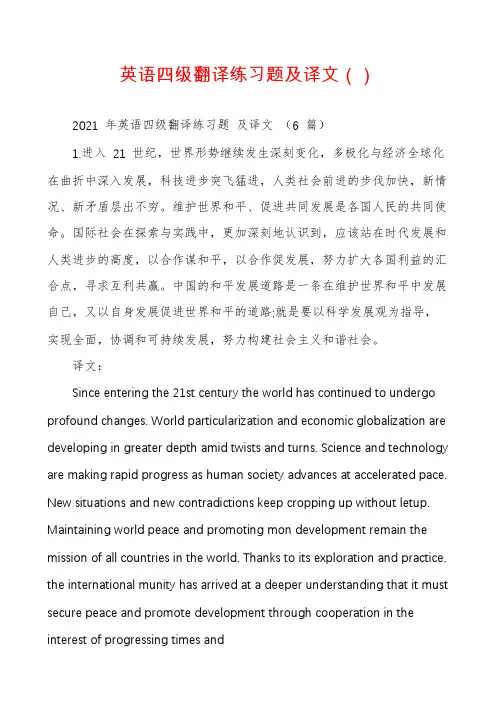
英语四级翻译练习题及译文()2021 年英语四级翻译练习题及译文(6 篇)1.进入21 世纪,世界形势继续发生深刻变化,多极化与经济全球化在曲折中深入发展,科技进步突飞猛进,人类社会前进的步伐加快,新情况、新矛盾层出不穷。
维护世界和平、促进共同发展是各国人民的共同使命。
国际社会在探索与实践中,更加深刻地认识到,应该站在时代发展和人类进步的高度,以合作谋和平,以合作促发展,努力扩大各国利益的汇合点,寻求互利共赢。
中国的和平发展道路是一条在维护世界和平中发展自己,又以自身发展促进世界和平的道路;就是要以科学发展观为指导,实现全面,协调和可持续发展,努力构建社会主义和谐社会。
译文:Since entering the 21st century the world has continued to undergo profound changes. World particularization and economic globalization are developing in greater depth amid twists and turns. Science and technology are making rapid progress as human society advances at accelerated pace. New situations and new contradictions keep cropping up without letup. Maintaining world peace and promoting mon development remain the mission of all countries in the world. Thanks to its exploration and practice, the international munity has arrived at a deeper understanding that it must secure peace and promote development through cooperation in the interest of progressing times andhuman advancement and seek mutual benefits and win-win results by earnestly expanding the convergence of interests of all countries. China s peaceful development is a path of developing itself while maintaining world peace and promoting world peace with its own development. With the guideline of the concept of scientific development, China will achieve a prehensive, coordinated and sustainable development and build a harmonious socialist society. 2.尽管中国古代神话(mythology)没有十分完整的情节,神话人物也没有系统的家谱(genealogy),但它们却有着鲜明的东方文化特色,其中尤为显著的是它的尚德精神(the spirit of esteeming virtue)。
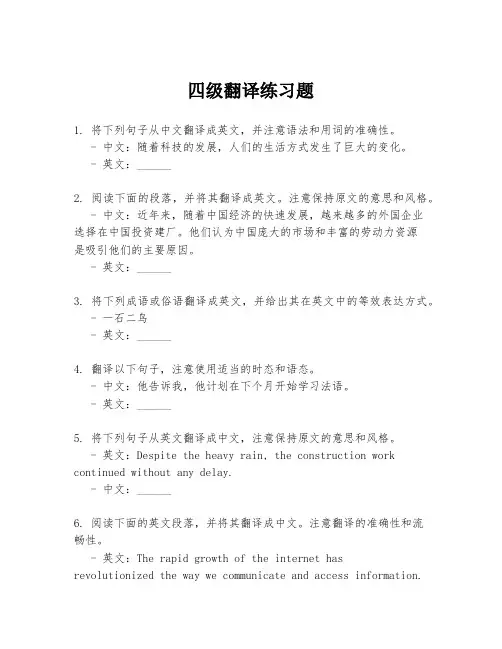
四级翻译练习题1. 将下列句子从中文翻译成英文,并注意语法和用词的准确性。
- 中文:随着科技的发展,人们的生活方式发生了巨大的变化。
- 英文:______2. 阅读下面的段落,并将其翻译成英文。
注意保持原文的意思和风格。
- 中文:近年来,随着中国经济的快速发展,越来越多的外国企业选择在中国投资建厂。
他们认为中国庞大的市场和丰富的劳动力资源是吸引他们的主要原因。
- 英文:______3. 将下列成语或俗语翻译成英文,并给出其在英文中的等效表达方式。
- 一石二鸟- 英文:______4. 翻译以下句子,注意使用适当的时态和语态。
- 中文:他告诉我,他计划在下个月开始学习法语。
- 英文:______5. 将下列句子从英文翻译成中文,注意保持原文的意思和风格。
- 英文:Despite the heavy rain, the construction work continued without any delay.- 中文:______6. 阅读下面的英文段落,并将其翻译成中文。
注意翻译的准确性和流畅性。
- 英文:The rapid growth of the internet hasrevolutionized the way we communicate and access information.It has also created new opportunities for businesses to reach a global audience.- 中文:______7. 翻译以下句子,注意使用适当的连接词。
- 英文:Not only did he finish his homework, but he also helped his younger brother with his.- 中文:______8. 将下列句子从中文翻译成英文,注意使用恰当的词汇。
- 中文:她对艺术有着浓厚的兴趣,经常参观博物馆和画廊。
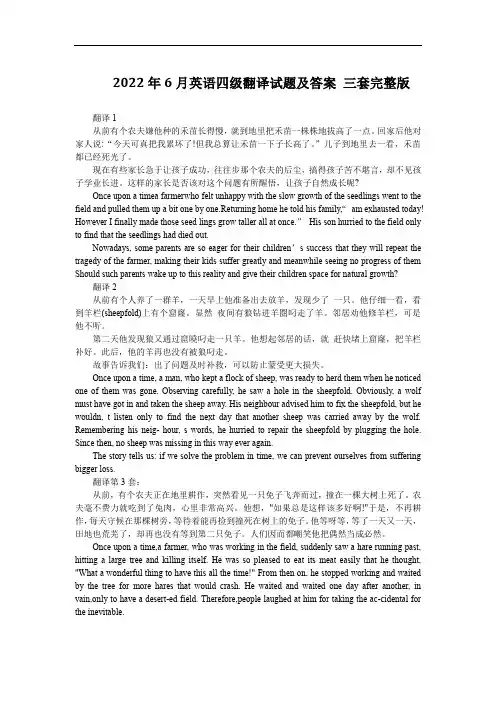
2022年6月英语四级翻译试题及答案三套完整版翻译1从前有个农夫嫌他种的禾苗长得慢,就到地里把禾苗一株株地拔高了一点。
回家后他对家人说:“今天可真把我累坏了!但我总算让禾苗一下子长高了。
”儿子到地里去一看,禾苗都已经死光了。
现在有些家长急于让孩子成功,往往步那个农夫的后尘,搞得孩子苦不堪言,却不见孩子学业长进。
这样的家长是否该对这个问题有所醒悟,让孩子自然成长呢?Once upon a timea farmerwho felt unhappy with the slow growth of the seedlings went to the field and pulled them up a bit one by one.Returning home he told his family,“am exhausted today! However I finally made those seed lings grow taller all at once.”His son hurried to the field only to find that the seedlings had died out.Nowadays, some parents are so eager for their children’s success that they will repeat the tragedy of the farmer, making their kids suffer greatly and meanwhile seeing no progress of them Should such parents wake up to this reality and give their children space for natural growth?翻译2从前有个人养了一群羊,一天早上他准备出去放羊,发现少了一只。
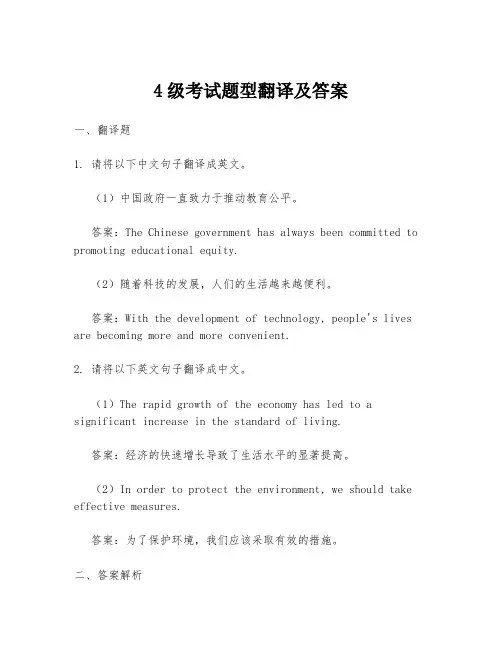
4级考试题型翻译及答案一、翻译题1. 请将以下中文句子翻译成英文。
(1)中国政府一直致力于推动教育公平。
答案:The Chinese government has always been committed to promoting educational equity.(2)随着科技的发展,人们的生活越来越便利。
答案:With the development of technology, people's lives are becoming more and more convenient.2. 请将以下英文句子翻译成中文。
(1)The rapid growth of the economy has led to a significant increase in the standard of living.答案:经济的快速增长导致了生活水平的显著提高。
(2)In order to protect the environment, we should take effective measures.答案:为了保护环境,我们应该采取有效的措施。
二、答案解析1. 对于中文翻译成英文的句子,考生需要注意时态和语态的转换,同时要确保翻译的准确性和流畅性。
(1)“一直致力于”在英文中通常翻译为“has always been committed to”,表示持续的动作。
(2)“随着科技的发展”在英文中使用“With the development of technology”来表达,而“越来越便利”则翻译为“becoming more and more convenient”。
2. 对于英文翻译成中文的句子,考生需要注意词汇的准确选择和句子结构的合理布局。
(1)“rapid growth”翻译为“快速增长”,“significant increase”翻译为“显著提高”,“standard of living”翻译为“生活水平”。
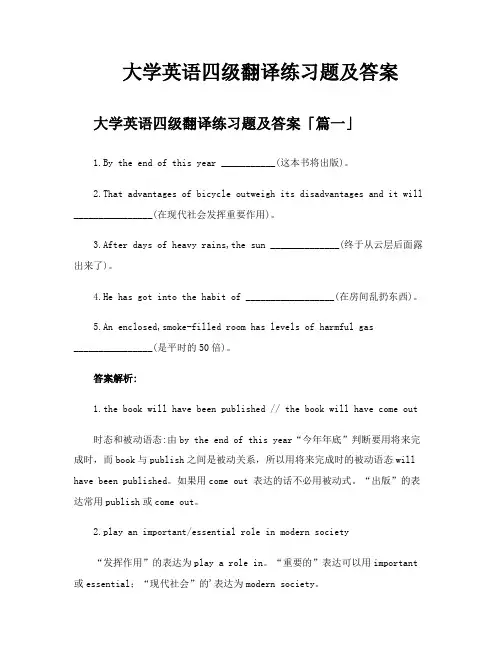
大学英语四级翻译练习题及答案大学英语四级翻译练习题及答案「篇一」1.By the end of this year ___________(这本书将出版)。
2.That advantages of bicycle outweigh its disadvantages and it will ________________(在现代社会发挥重要作用)。
3.After days of heavy rains,the sun ______________(终于从云层后面露出来了)。
4.He has got into the habit of __________________(在房间乱扔东西)。
5.An enclosed,smoke-filled room has levels of harmful gas________________(是平时的50倍)。
答案解析:1.the book will have been published // the book will have come out时态和被动语态:由by the end of this year“今年年底”判断要用将来完成时,而book与publish之间是被动关系,所以用将来完成时的被动语态will have been published。
如果用come out 表达的话不必用被动式。
“出版”的表达常用publish或come out。
2.play an important/essential role in modern society“发挥作用”的表达为play a role in。
“重要的”表达可以用important 或essential;“现代社会”的'表达为modern society。
3.emerged from behind the clouds at last考查介词:为了准确表达方位,from后面可接另外一个介词宾语,behind the clouds整体表示一个位置;云层后面。
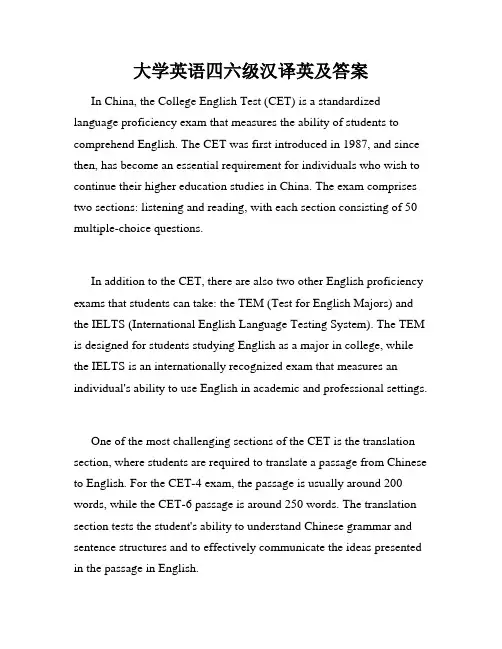
大学英语四六级汉译英及答案In China, the College English Test (CET) is a standardized language proficiency exam that measures the ability of students to comprehend English. The CET was first introduced in 1987, and since then, has become an essential requirement for individuals who wish to continue their higher education studies in China. The exam comprises two sections: listening and reading, with each section consisting of 50 multiple-choice questions.In addition to the CET, there are also two other English proficiency exams that students can take: the TEM (Test for English Majors) and the IELTS (International English Language Testing System). The TEM is designed for students studying English as a major in college, while the IELTS is an internationally recognized exam that measures an individual's ability to use English in academic and professional settings.One of the most challenging sections of the CET is the translation section, where students are required to translate a passage from Chinese to English. For the CET-4 exam, the passage is usually around 200 words, while the CET-6 passage is around 250 words. The translation section tests the student's ability to understand Chinese grammar and sentence structures and to effectively communicate the ideas presented in the passage in English.In preparation for the exam, students are encouraged to read extensively in English and to practice translating Chinese passages into English. There are also many resources available online, such as practice exams and study materials, to help students prepare for the test.To give an example of a CET translation passage, I will provide a sample passage from the CET-4 exam:原文:假设你是李华,你的美国朋友Jim来信说他很忙,没有时间学汉语了。
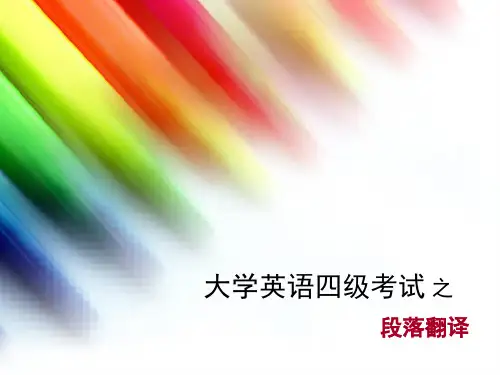
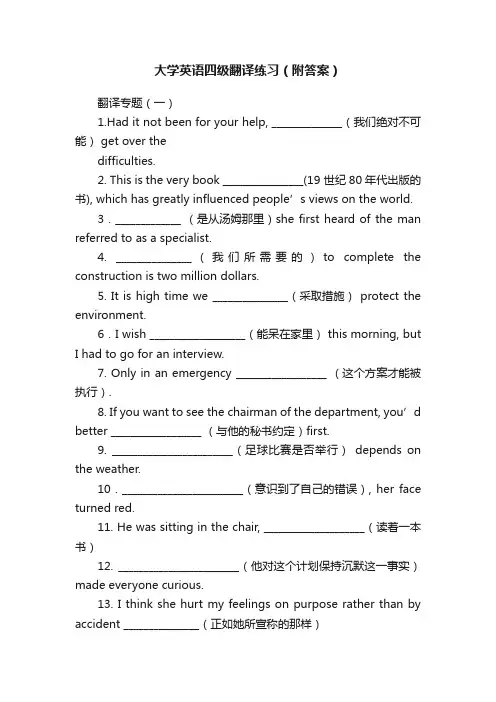
大学英语四级翻译练习(附答案)翻译专题(一)1.Had it not been for your help, ______________(我们绝对不可能) get over thedifficulties.2. This is the very book ________________(19 世纪80年代出版的书), which has greatly influenced people’s views on the world.3._____________ (是从汤姆那里)she first heard of the man referred to as a specialist.4. _______________(我们所需要的)to complete the construction is two million dollars.5. It is high time we _______________(采取措施) protect the environment.6.I wish ___________________(能呆在家里) this morning, butI had to go for an interview.7. Only in an emergency __________________ (这个方案才能被执行).8. If you want to see the chairman of the department, you’d better __________________ (与他的秘书约定)first.9. ________________________(足球比赛是否举行)depends on the weather.10.________________________(意识到了自己的错误), her face turned red.11. He was sitting in the chair, ____________________(读着一本书)12. ________________________(他对这个计划保持沉默这一事实)made everyone curious.13. I think she hurt my feelings on purpose rather than by accident _______________(正如她所宣称的那样)14.The factory’s output this year is __________________(去年的产量的三倍).15. Doctors suggest that people ______________(不应该熬夜)even on holidays.16. ______________________(要是妈妈知道了怎麽办?)Do you think she will get angry?17. _______________(众所周知), too much stress can cause disease.18. _____________(吃的药越多), the worse I seem to feel.19. _________________(直到1986 年)that table tennis was accepted as a regular part of the Olympic Games.20. It was essential that the application forms __________________ (在截至日期被送回).21. ______________(有迹象表明)restaurants are becoming more popular with families.22. Researchers are trying to discover how this built-in biological time clock works _______________________(以便他们能减慢其过程).23. _______________________(为了在最短时间内赶上他的同学), Sam decided to work during the weekend.24. ____________________(比尔从未想过)that his proposal would be met with disapproval at the meeting.25. It took Jim about two weeks __________________(习惯他的新工作)as a sales manager.26._________________(闭上眼睛,静静地躺在稻草上), he made an effort of will to overcome the pain.27. The professor encouraged students to think independently instead of ___________________________ ( 把自己的思想强加给)them.28. __________________(为了安全起见), all dangerous things should be placed beyond children’s reach.29. In that case, several government officials ____________ (被指控)economic crimes.30. _____________(尽管得到了出版), his work didn’t attract much attention.31. She can’t afford to buy a house in Beijing, so she ____________(别无选择)rent an apartment.32. _________________(现在已经很晚了), we took our things and retired to our room.33. Measured against the achievement of his friends, Jack thinks that his work is ______________(远不能令人满意).34. He said he worked hard not so much to fulfill his dreams as to ______________(不辜负他父母的期望).35. ___________________(多亏他们的参与), the plan is carried out smoothly. 36.Though built before World War Two, the engine is still _____________(处于良好的状态).37. Everyone should _______________(有资格享受)a decent standard of living andan opportunity to be educated.38.The manager________________(高度赞扬)such virtues as loyalty, courage and truthfulness shown by his emphasis.39. ________________(受美国一所大学的邀请), I finally flew to San Francisco on August 6, 1988.40.When the temperature becomes extreme, ____________(人们不断抱怨天气).41. ______________(尽管他们有着各种各样的困难), the sailors were determined to unload the ship ahead of schedule.42. People’s attitude toward drugs ________________(每个人各不相同).翻译专题(二)1.The special committee recommended that _________________________________ (这项工程不应动工) until all the preparations have been made.2.The audience must have missed their musical performance or they________________________________________(给予高度评价).3.________________________________________(你最好行为规矩些) if you do not wantyour boss to lose his temper.4.Joe is not good at sports, but ___________________________ (说到数字), he isthe best in the class.5.Not only ____________________________ (这家工厂完成生产任务) last year, but italso doubled its output6.If we___________________________(对此视而不见),we shall make the gravest errorimaginable.7.How can one ______________________(袖手旁观) when a woman is being attacked androbbed in broad daylight?8.The secretary ____________________________(详细记录) what the members of theBoard of Directors had discussed at the meeting.9.The firm has decided to switch to another line of products, as these___________________(不畅销).10.The local government has set up a number of technical schools to meet the needsof ________________________________________(迅速发展的经济)in the region. 11.We felt very disappointed after the show,________________________________.(因为很多应该参加演出的名演员没有来)12.After he has retired,_______________________________________.(他准备把精力投入到慈善事业中去)13.He works very hard___________________________________.(好像永远不打算睡觉似的)14.He will surely succeed ___________________________________.(只要你不停的努力)15.What he objects to is the bureaucracy, _______________________________.(这种情况正在不断滋长)翻译专题(三)1.She ____________________________________(对我们的警告充耳不闻)and got lost.2.That Canadian speaks Chinese ______________________________________(和他说英语一样流利).3.___________________________(Tony是否来) doesn’t matter much. We can rely onourselves.4.On hearing that news, I __________________________ (忍不住笑起来) and spreadit among the class.5.Not until Alice had a baby of her own _______________________________ (她才了解) how hard it was for her mother to have brought up hersister and her on her own.6.Can you prove that ________________________________ (是Henry偷了我的电脑吗) ?7.Chinese President, Hu Jintao called on the whole country___________________________ (与时俱进).8.But for his teacher’s help he _____________________________________ (是不会成功的).9.Since the death of her husband, she got into the habit of___________________________ (让门一直关着).10.Remember that the less processed a food,_______________________________ (它的矿物质和维生素含量就越高).11.__________________________________________ (虽然我们已经取得很大进步), westill have a long way to go.12.Tom__________________________________________________(太骄傲了,以至于看不出到自己的缺点).13.We have to admit the fact that________________________________________(生命的质量和生命本身一样重要).14.It is time___________________________________________ (当局采取适当的措施来解决交通问题).15.Only in this way,_____________________________________ (你才能学好英语).翻译专题(一)1.we would never have been able to2.that was published in the 1880s3.It was from Tom that4.What we need5.took measures to6.I could have stayed at home7.can this plan be carried out8.make an appointment with his secretary9.Whether the football match will be played or not10.Having realized her mistake/ Conscious of her mistake11.reading a book12.The fact that he kept silent about the plan13.as she claimed14.three times as much as that of last year15.(should ) not stay up16.What if Mother knows about it17.As is known to all18.The more medicine I take19.It was not until 198620.(should) be sent back before the deadline21. There are signs that22.so that they can slow down the process23.in order to catch up with his classmates in the shortest period oftime24.I never occurred to Bill25.to get used to his new job26.Closing his eyes and lying on the hay27.imposing their own ideas on28.For the sake of safety29.were accused of / were charged with30.Published as it was/ Although it was published31.has no choice but to32.It being pretty late now33.far from being satisfactory34.live up to his parents’ expectations35.Thanks to their participation36.in good condition37.be entitled to38.spoke highly of39.Having been invited by an American university40.people constantly complain about the weather41.In spite of all the difficulties they had42.varies from person to person翻译专题(二)1.the project not be started考点:虚拟语气,动词recommend后的宾语从句中使用should 加动词原形的虚拟式,should 可以省略.2.would have spoken highly of it考点:1)虚拟语气,表示和过去事实相反时,主句用would have done 结构;2)短语“给予…高度评价”,可译为speak highly of….3.You’d better behave yourself考点:1)句型“最好做某事”用had better do sth.; 2) 短语“行为规矩些”应译为behave yourself.4.when it comes to mathematics maths考点:1)“说到”用短语when it comes to,该短语通常用于引起另一个话题,本题中从“体育”到“数学”即是转换了话题;2)时态,本句其他部分的时态都是一般现在时,故从句中的动词come 用第三人称单数形式comes.5.did the factory fulfill the production考点:1)not only 放在句首时局自需部分倒装,即助动词提前,居中时态为过去时,故用did; 2) 短语“完成生产任务”可译为fulfill the production, fulfill 有“实现,完成(计划)”的意思,“任务”可不译出来.6.are blind to this考点:“视而不见”还可以翻译为:turn a blind eye to; take no notice of ; pretend not to see7.stand by考点:考查常用成语。
Unit 11. 这种植物只有在培育它的土壤中才能很好地成长。
The plant does not grow well in soils other than the one in which it has been developed.2. 研究结果表明,无论我们白天做了什么事情,晚上都会做大约两个小时的梦。
Research findings show that we spend about two hours dreaming every night, no matter what we may have done during the day.3. 有些人往往责怪别人没有尽最大努力,以此来为自己的失败辩护。
Some people tend to justify their failure by blaming others for not trying their best.4. 我们忠于我们的承诺:凡是答应做的,我们都会做到。
We remain true to our commitment: Whatever we promised to do, we would do it.5. 连贝多芬的父亲都不相信自己儿子日后有一天可能成为世界上最伟大的音乐家。
爱迪生也同样如此,他的老师觉得他似乎过于迟钝。
Even Beethoven's father discounted the possibility that his son would one day become the greatest musician in the world. The same is true of Edison, who seemed to his teacher to be quite dull.6. 当局控告他们威胁国家安全。
They were accused by the authorities of threatening the state security.Unit21 .要是这部喜剧中的人物更幽默些的话,就会吸引更多的观众。
2020年大学英语四级考试翻译试题及答案(1)聘金(endowment)是中国传统习俗的一部分。
通常,新郎(bridegroom)需要给新娘家一笔钱作为聃礼来定下婚礼。
但是近几年来其标准不断上升,致使大多数家庭都很难达到。
快速上涨的生活成本是聘金增加的主要原因。
对于大多数年轻人来说,结婚意味着独立组建家庭,然而物价的不断上涨使这一切变得越来越困难。
因此,许多新婚夫妇都只能向父母求助。
表达难点1.第2句中的“作为聘礼”在汉译英时,可以顺承前面一句“聘金”而省略不译。
“来定下婚礼”表目的,故将其译作状语to fix a marriage。
2.第3句“……不断上升,致使大多数家庭都很难达到”表因果关系,可用so...that...结构来表达,“某人很难做某事”英语对应的表达为sb. finds it difficult to do sth,此句可译为...have become so high... that a majority of families are finding it difficult to meet them。
3.翻译第4句“快速上涨的生活成本是聘金增加的主要原因”时,如果按照原主干“生活成本是主要原因译,则不能很好表达出原句强调“上涨”的利害关系,故转换结构,用“快速上涨”作主语用介词短语in the living cost 作定语。
4.倒数第2句中的“结婚意味着独立组建家庭,然而物价的不断上涨使这一切变得越来越困难”是一个表转折的并列句。
但通过分析发现,“这一切”指代前半句内容,故可用which引导非限制性定语从句将前后分句联系起来,以避免不必要的信息重复,这样句子更加简洁紧凑。
“物价的不断上涨”处理成原因状语because of the constantly rising prices 置后,使句子表达清晰流畅。
参考译文Endowment is part of Chinese tradition. Usually, a bridegroom needs to pay a certain amount of money to the bride's family to fix a marriage. But the standards have become so high in recent years that a majority of families are finding it difficult to meet them. The rapid rise in the living cost is the main reason for the increase of endowment. For most young people, marriage means setting up a family independently, which has become increasingly difficult because of the constantly rising prices. Consequently, many newly married couples turn to their parents for help.2020年大学英语四级考试翻译试题及答案(2)中国结(Chinese knot)是中国文化的典型代表之一。
昆曲Kunqu Opera昆曲是中国古老戏曲中的一种,起源于江苏昆山,拥有600多年的历史。
它是连接过去与现在,中国与世界的纽带,对现今中国的戏曲形式,包括川剧与京剧在内,都产生了重要的影响。
昆曲蕴含了各种意象美,从音乐、舞蹈到诗歌,人们的精神世界甚至中国人的灵魂,都有所体现。
正因为如此,昆曲在过去广受欢迎,也成了中国文化遗产中最珍贵的部分。
但是现在,昆曲不仅面临着来自大众流行文化的挑战,而且年轻人也对其缺乏兴趣。
只有进行适当的保护,昆曲才能拥有美好的未来。
Kunqu Opera, which originated in the Kunshan region of Jiangsu province, is one of China’s classical operas with a history of more than 600 years. Kunqu Opera serves as a link between past and present, China and the world. It has exerted a dominant influence on recent forms of opera in China, including the Sichuan and Beijing operas. Kunqu Opera embraced every imaginable beauty, from music and dance, to poetry and people’s spirit world and even very soul of the Chinese nation, so that Kunqu Opera was so popular in the past and became the most valuable parts of China’s cultural heritage. But now, Kunqu Opera is facing competition from mass culture and a lack of interest amongst the young. It can only have a bright future when it is protected in a proper way.》》更多精彩冲分课程:四级暑期集训营四级基础冲刺班四级强化班六级暑期集训营六级基础冲刺班六级强化班英语四级作文模板分类记:提出问题类模版1It is quite natural for ________to ponder over the question of whether to _______________.Many _________will choose not to______________,generally for three reasons.On the one hand,___________.On the other hand,______________.Mostimportantly,__________.Nevertheless, oher people adopt a completely different view,thinking that_____________.Moreover, they further argue that___________.From what we have discussed above,we can draw the conclusion that the question quite depends on personal choice.In my own eyes,________.模版2When taking about whether _____________,we will be most surprised to fnd that the present situation is utterly complicated,For one thing ,__________.For another,_________.Three factors,in my point of view,account for this phenomenon.First and foremost,________.Secondly,____________.Last but not least,____________.As far as I am concerned,I firmly believe that____________,only when_____________.模版3A national debate has sprung up on_____________.Many people welcome it with applause and enthusiasm,believing that___________.However, those who strongly oppose the _________are not among the minority.They hold that______________.Moreover,____________.In aword,______________.From my perspective,________should be____________.On the one hand,personally I would argue that_____________.On the other hand,____________.In conclusion,____________.。
拔苗助长-2022.6四级翻译真题练习 - 拔苗助长高了。
”儿子到地里去一看,禾苗都已经死光了。
Returning home, he told his family, “I am exhausted 【1】today! However, I finally 【2】 made those seedlings grow taller all at once." His son hurried to the field only to find that the slow growth of the seedlings 【2】, went to the field and pulled 【3】them up a bit one by one.【1】unhappy [ʌn ˈh æpi] adj.不快乐的;不幸的;不满的;不悦的;不幸福的;难过的;悲伤 不高兴的;不适当的【2】seedlings [ˈsi ːdl ɪŋz] seedling的复数n.秧苗;籽苗;幼苗【3】pulled [p ʊld] pull的过去分词和过去式v.拉;拽;扯;拖;拔出;抽出;(向某方向)拖,拉动adj.扯下来的;拔去了毛的;健康衰退了的回家后他对家人说:“今天可真把我累坏了!但我总算让禾苗一下子长hope is the sunshine of life, action is the wings of hope.希望是生命的阳光,行动是希望的翅膀。
【原文】从前有个农夫嫌他种的禾苗长得慢,就到地里把禾苗一株株地拔高了一点。
回家后他对家人说:“今天可真把我累坏了!但我总算让禾苗一下子长高了。
”儿子到地里去一看,禾苗都已经死光了。
现在有些家长急于让孩子成功,往往步那个农夫的后尘,搞得孩子苦不堪言,却不见孩子学业长进。
这样的家长是否该对这个问题有所醒悟,让孩子自然成长呢? 从前有个农夫嫌他种的禾苗长得慢,就到地里把禾苗一株株地拔高了一点。
cet-4翻译题原文:中国的农村地区是一个充满活力和机遇的地方。
近年来,中国政府加大了对农村经济的支持力度,推动农村地区的发展。
农村地区的基础设施得到改善,交通、通信和电力等方面的发展加速。
此外,农村地区的教育、医疗和社会保障等公共服务也得到了提升。
这些举措为农村地区的发展提供了有利条件。
翻译:Rural areas in China are a place full of vitality and opportunities. In recent years, the Chinese government has increased its support for the rural economy and promoted the development of rural areas. The infrastructure in rural areas has been improved, with accelerated development in transportation, communication, and electricity, among other areas. In addition, public services such as education, healthcare, and social security in rural areas have also been enhanced. These measures have provided favorable conditions for the development of rural areas.例句:1. Rural areas in China are undergoing rapid development,with increased investment in infrastructure and improved public services. 中国的农村地区正在经历快速发展,基础设施投资增加,公共服务得到了改善。
2020 年大学英语四级考试翻译练习题( 6 )京剧京剧 (Beijing Opera) 是中国的国粹。
作为一门古老的艺术,京剧的服装 (costume) 、脸谱 (facial mask) 更易被人喜爱。
不同的服装类型反映不同的人物身份特征。
富贵者的服装缀满精美的刺绣; 穷困者的服装则简单朴素,少有装饰 (elemental) 。
脸谱是京剧中塑造人物形象的重要手段,它是用不同的颜色在脸上勾画出来的。
脸谱的颜色让人一看便知角色 (portray) 的善恶。
比如白色代表奸诈(treachery) ,黑色代表正直不阿,黄色是骁勇,蓝、绿色多用于绿林好汉(rebellious fighters) ,金、银色多用于神佛 (divinity and Buddhism)等。
翻译: Beijing Opera is the cream of the Chinese culture.As a tradi?tional art form, its costumes and facial mask aremore popular with people. Different styles of costumes areused to reflect the status of different characters. There aremore decorations in the costumes of nobles ,while those ofthe poor tend to be simple and less elemental. Facial maskscan reflect qualities of different characters. Facial masksusing different colors are important ways to portray acharacter. People can tell a hero from a villain by thecolors of the masks. In general ,white usually represents treachery, black represents righteousness, yellow representsbravery, blue and green represent rebellious fighters ,while gold and silver represent divinity and Buddhism.腊八节腊八节 (the Laba Festival) 在农历最后一个月的第八天庆祝,标志着春节庆祝活动的开始。
2020年大学英语四级考试翻译练习题(6)
京剧
京剧(Beijing Opera)是中国的国粹。
作为一门古老的艺术,京剧
的服装(costume)、脸谱(facial mask)更易被人喜爱。
不同的服装类
型反映不同的人物身份特征。
富贵者的服装缀满精美的刺绣;穷困者
的服装则简单朴素,少有装饰(elemental)。
脸谱是京剧中塑造人物
形象的重要手段,它是用不同的颜色在脸上勾画出来的。
脸谱的颜色
让人一看便知角色(portray)的善恶。
比如白色代表奸诈(treachery),黑色代表正直不阿,黄色是骁勇,蓝、绿色多用于绿林好汉
(rebellious fighters),金、银色多用于神佛(divinity and
Buddhism)等。
翻译:Beijing Opera is the cream of the Chinese culture.
As a tradi?tional art form, its costumes and facial mask are
more popular with people. Different styles of costumes are
used to reflect the status of different characters. There are
more decorations in the costumes of nobles,while those of
the poor tend to be simple and less elemental. Facial masks
can reflect qualities of different characters. Facial masks
using different colors are important ways to portray a
character. People can tell a hero from a villain by the
colors of the masks. In general,white usually represents treachery, black represents righteousness, yellow represents
bravery, blue and green represent rebellious fighters,while gold and silver represent divinity and Buddhism.
腊八节
腊八节(the Laba Festival)在农历最后一个月的第八天庆祝,标
志着春节庆祝活动的开始。
“腊”指“腊月(the 12th lunar month)”,是农历第十二个月,“八”指的是数字8。
腊八节通常在
1月中旬。
绝大部分汉族人遵循腊八节喝腊八粥(Laba rice porridge)的习俗。
腊八粥最早在宋朝传入中国。
据史料记载,一些大型寺庙会
为穷人提供腊八粥来表达对佛祖(Buddha)的虔诚。
明朝时,腊八粥成为皇帝在此节日赏赐群臣的神圣食物。
翻译:Laba Festival is celebrated on the eighth day of
the last lunar month, marking the beginning of celebrating
the Chinese Spring Festival. La means the 12th lunar month
and ba means the number eight. The date usually falls in mid-January. The majority of people from Han nationality has
followed the tradition of eating Laba rice porridge on the
Laba Festival. Laba rice porridge was first introduced to
China in the Song Dynasty. According to historical records,
some large temples would offer the poor Laba rice porridge to
show their faith to Buddha. In the Ming Dynasty, it became a
holy food that emperors would use to award their officials on
the festival.。